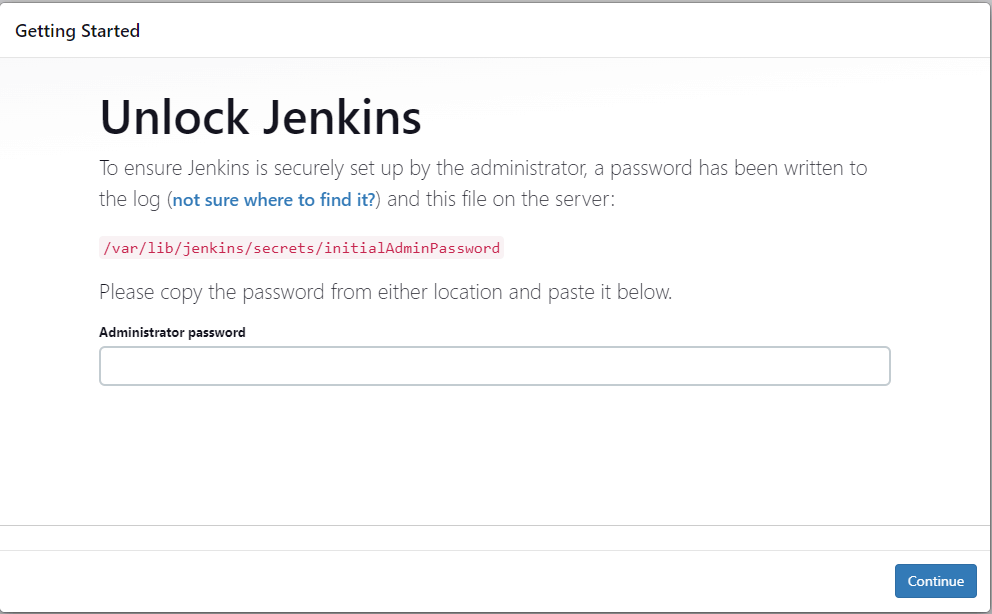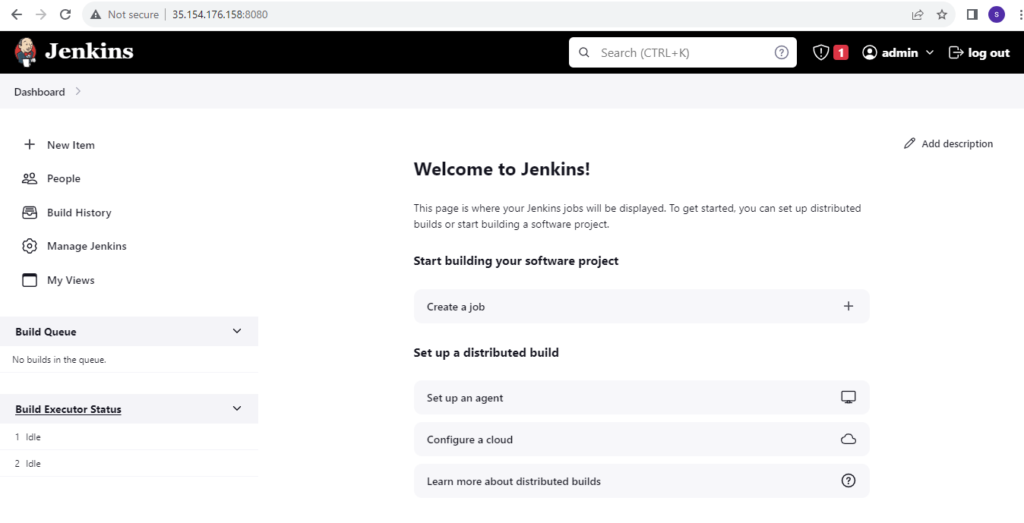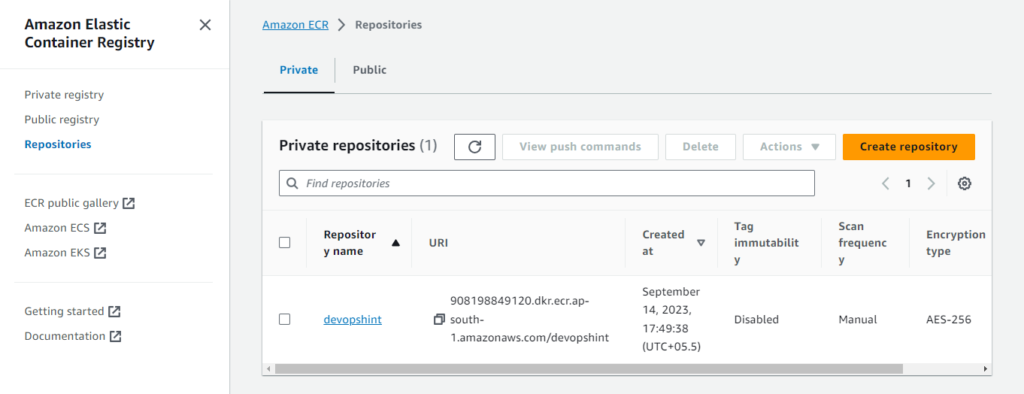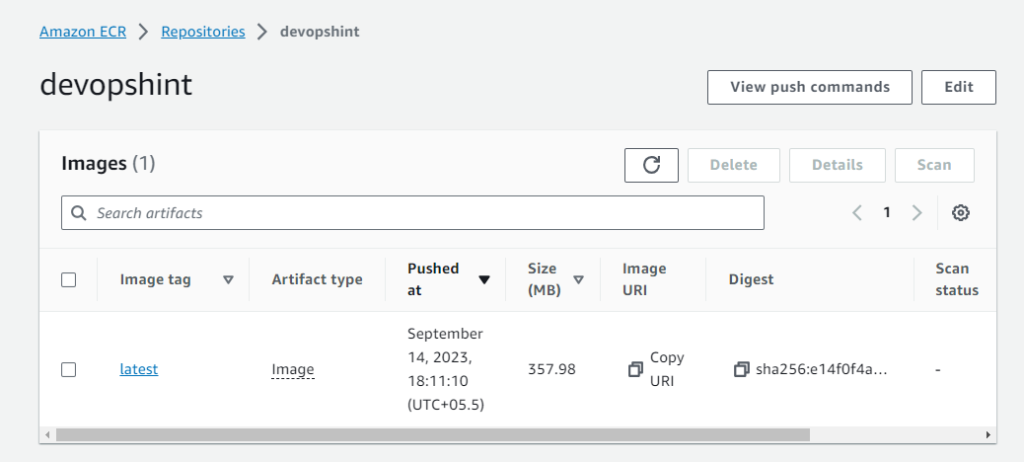In this article we are going to learn Configuring EC2 instance in AWS, Install Java on Ubuntu 22.04 LTS, Install Jenkins on Ubuntu 22.04 LTS, Add AWS credentials in Jenkins, Creating ECR Repository in AWS, Create AmazonEC2ContainerRegistryFullAccess IAM Role in AWS, how to Build and Push Docker image to AWS ECR using Jenkins pipeline.
Table of Contents
Prerequisites:
- AWS Account with Admin Privileges
- GitHub Account
Step #1:Configuring EC2 instance in AWS
Go to the AWS dashboard and then to the EC2 services. create an instance
Step #2:Install Java on Ubuntu 22.04 LTS
After the successful SSH connection, firstly update the Linux machine. And install java using below commands:
sudo apt update
Now lets install java 17
sudo apt install openjdk-17-jre
Lets check the version of java
java -version
Step #3:Install Jenkins on Ubuntu 22.04 LTS
Lets install jenkins using below commands
curl -fsSL https://pkg.jenkins.io/debian/jenkins.io-2023.key | sudo tee \ /usr/share/keyrings/jenkins-keyring.asc > /dev/null
echo deb [signed-by=/usr/share/keyrings/jenkins-keyring.asc] \ https://pkg.jenkins.io/debian binary/ | sudo tee \ /etc/apt/sources.list.d/jenkins.list > /dev/null
sudo apt-get update
sudo apt-get install jenkins
Step #4:Enable and start Jenkins on Ubuntu 22.04 LTS
You can enable the Jenkins service to start at boot with the command
sudo systemctl enable jenkins
You can start the Jenkins service with the command
sudo systemctl start jenkins
You can check the status of the Jenkins service using the command
sudo systemctl status jenkins

Step #5:Install git on Ubuntu 22.04 LTS
We need to Install git using below command
sudo apt install git
Step #6:Access Jenkins on Browser
https//:<Instance_ip>:8080
After that On the browser, you should see the Jenkins interface that asks for the administrator password.

Now cat the following Jenkins file to retrieve the Administrator password and paste it to the Jenkins dashboard.
Here, create a Jenkins user
After the configuration is completed, you should see the Jenkins dashboard.

Step #7:Add AWS credentials in Jenkins
We may also set up AWS credentials in Jenkins so that it facilitates the Docker push to the ECR repository.
GO to the Manage Jenkins>>Credentials>>system>>Global credentials
Then add credentials and here add AWS username and password and account ID

Step #8:Install Docker on Ubuntu 22.04 LTS
Now here we need to Install Docker
sudo apt install docker.io
After Installing Docker we need to give some permission
sudo usermod -aG docker $USER
sudo chmod 666 /var/run/docker.sock
After installing docker lets Restart jenkins
sudo systemclt restart jenkins
Step #9:Installing plugins in Jenkins
Go to the manage Jenkins>>Plugins>>Available Plugin
- Docker
- Docker Pipeline
- Amazon ECR plugin
Step #10:Creating ECR Repository in AWS
Lets Create AWS ECR repository to push this image so Go to AWS ECR repository and create

Step #11:Create AmazonEC2ContainerRegistryFullAccess IAM Role in AWS
Here in this step we need to create IAM role with below permission
Attach permission policies : AmazonEC2ContainerRegistryFullAccess

Step #12:Install AWS CLI on Ubuntu 22.04 LTS
You can go to the official site of AWS and Install
curl "https://awscli.amazonaws.com/awscli-exe-linux-x86_64.zip" -o "awscliv2.zip"
unzip awscliv2.zip
sudo ./aws/install
Step #13:Push Docker image to AWS ECR using Jenkins pipeline
So lets create jenkins pipeline go to the Jenkins Dashboard Click on new Item select Pipeline and paste this code
pipeline {
agent any
environment {
AWS_ACCOUNT_ID="222222222222"
AWS_DEFAULT_REGION="us-east-1"
IMAGE_REPO_NAME="jenkins-pipeline"
IMAGE_TAG="v1"
REPOSITORY_URI = "22222222222.dkr.ecr.us-east-1.amazonaws.com/jenkins-pipeline"
}
stages {
stage('Logging into AWS ECR') {
steps {
script {
sh """aws ecr get-login-password --region ${AWS_DEFAULT_REGION} | docker login --username AWS --password-stdin ${AWS_ACCOUNT_ID}.dkr.ecr.${AWS_DEFAULT_REGION}.amazonaws.com"""
}
}
}
stage('Cloning Git') {
steps {
checkout([$class: 'GitSCM', branches: [[name: '*/master']], doGenerateSubmoduleConfigurations: false, extensions: [], submoduleCfg: [], userRemoteConfigs: [[credentialsId: '', url: 'https://github.com/sd031/aws_codebuild_codedeploy_nodeJs_demo.git']]])
}
}
// Building Docker images
stage('Building image') {
steps{
script {
dockerImage = docker.build "${IMAGE_REPO_NAME}:${IMAGE_TAG}"
}
}
}
// Uploading Docker images into AWS ECR
stage('Pushing to ECR') {
steps{
script {
sh """docker tag ${IMAGE_REPO_NAME}:${IMAGE_TAG} ${REPOSITORY_URI}:$IMAGE_TAG"""
sh """docker push ${AWS_ACCOUNT_ID}.dkr.ecr.${AWS_DEFAULT_REGION}.amazonaws.com/${IMAGE_REPO_NAME}:${IMAGE_TAG}"""
}
}
}
}
}
Now lets Check ECR Repo our image push or not

Conclusion:
In this article we have covered Configuring EC2 instance in AWS, Install Java on Ubuntu 22.04 LTS, Install Jenkins on Ubuntu 22.04 LTS, Add AWS credentials in Jenkins, Creating ECR Repository in AWS, Create AmazonEC2ContainerRegistryFullAccess IAM Role in AWS, how to Build and Push Docker image to AWS ECR using Jenkins pipeline.
Related Articles:
How to Upload Artifact to Nexus using Jenkins
Reference:
